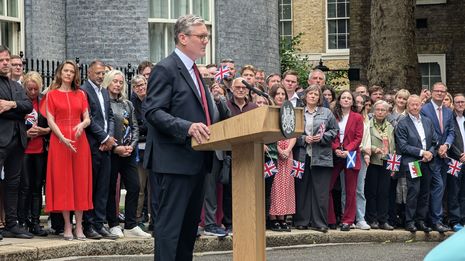Labour is betraying disabled people
Olive Watt argues that the government is betraying disabled people, and its roots, through cuts to disability benefits

When canvassing in the run-up to the general election in July, I spoke with many disabled voters who were struggling following over a decade of Conservative austerity. My walking stick was a pretty obvious giveaway that I, too, am disabled, and this common ground sparked a lot of conversation. During the same period, I conducted a funded research project into the impact of austerity on disabled experiences of social exclusion in Britain. A bleak picture emerged: disabled people are excluded due to failing health and social care systems, discriminatory social attitudes, and an absence of political representation. On the doorstep, there was a sense that change was coming. I assumed that for disabled people, this would be change for the better. Yet the government’s choice to cut Personal Independence Payments (PIP), the primary form of disability benefit in the UK, will destroy disabled lives.
This injustice is by no means new. In 2016, the UN found that ‘grave’ and ‘systematic’ violations of the human rights of disabled people occurred in Britain following the Conservatives’ introduction of austerity measures from 2010. In 2024, a follow-up report found that ‘no significant progress has been made’ with ‘signs of regression’ in some areas.
“It should be common sense that disabled people who cannot work are as worthy of dignity as any other human being”
These cuts are being framed as an initiative to get disabled people into work. If the government was serious about this, they could invest in SEND education, make disabled bus passes work before 9.30am, and sort out the backlog with the Access to Work scheme. Slashing the support that enables people to maintain the health required for work is not the solution.
This framing also implies that PIP is an out-of-work benefit. It is not. Rather, it is designed to support working-age people with the additional costs of being disabled, which total an average of £1,010 a month. I pay every day for being disabled. Everything from running my car, to buying mobility aids, to the various medications that keep me alive, come with a hefty price tag. Already, nearly half of families living in poverty include a disabled person, and estimates are that a further 700,000 people will be plunged into poverty due to these cuts.
When the health service is on its knees, people have endured a pandemic, and public services are struggling, it is no surprise that the number of disabled people is rising. The unequal distribution of disabled people across the country evidences the social nature of disability; the north-east has a higher proportion of disabled people than London (21.2% vs 15.7% according to the 2021 census). The government has the power to tackle the social conditions that produce disability, yet they have chosen to disable people further through senseless cuts.
“Slashing the support that enables people to maintain the health required for work is not the solution”
Labour’s rhetoric around supporting the ‘working people’ is telling. The belief that individuals’ worthiness of support and dignity is dependent on their ability to contribute to the economy is underpinned by an ableist, quasi-eugenicist ideology. It should be common sense that disabled people who cannot work are as worthy of dignity as any other human being.
Among the proposals is stricter eligibility criteria for PIP, despite the benefit already being frequently refused to those who need it. Between 2018 and 2023, 70% of rejected PIP applications were overturned at tribunal. It is also one of the benefits with the lowest fraud rate; the DWP found 0% fraud rate for PIP in 2024.
It is estimated that these cuts will save the government £5 billion a year by 2030; a saving that could easily be met with a 2% wealth tax on individuals with assets worth more than £10 million. This would affect just 0.04% of the UK population and would raise £24 billion a year. The deliberate choice has been made to make disabled people, rather than the ultra-wealthy, pay.
Resisting these cuts is a monumental challenge for disabled people, as we lack representation in politics. Twenty-three percent of the working age population is disabled. If Parliament was representative of the population, there would be 150 disabled MPs. In the general election last July, just nine openly-disabled MPs were elected. When I visited the public gallery of the House of Commons in March I was genuinely staggered to read the sign by the security checkpoint that listed prohibited items. Among them: cameras, umbrellas … and walking sticks – a very material expression of a wider pattern of exclusion.
I did not choose to be disabled; no one does. It can happen to anyone at any time. Labour was built on principles of equality, it produced the modern welfare state, and it was the party of Alf Morris, the disability rights campaigner who so many disabled people have to thank for the rights we do have today. The government is betraying this history by choosing to destroy the futures of disabled people in this country.
 News / Colleges charge different rents for the same Castle Street accommodation2 March 2026
News / Colleges charge different rents for the same Castle Street accommodation2 March 2026 News / News in Brief: waterworks, wine woes, and workplace wins 1 March 2026
News / News in Brief: waterworks, wine woes, and workplace wins 1 March 2026 News / Climate activists protest for ‘ethical careers policy’1 March 2026
News / Climate activists protest for ‘ethical careers policy’1 March 2026 News / Angela Merkel among Cambridge honorary degree nominees27 February 2026
News / Angela Merkel among Cambridge honorary degree nominees27 February 2026 News / Private school teacher who lied about Cambridge degree barred from teaching27 February 2026
News / Private school teacher who lied about Cambridge degree barred from teaching27 February 2026









